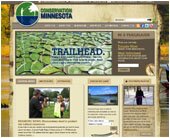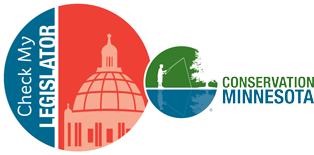“I took the trail to the river because I wanted to see open water again after nothing but solid ice on the lakes, brittle frozen brush, and snow that felt like sand. I wanted to see something moving and alive and listen to the gurgle of water as it rippled its way around the rocks of some open place that had never quite closed.”
Sigurd F. Olson
The Singing Wilderness - 1956
 One of the greatest champions for wilderness preservation in America was Minnesota’s own Sigurd Olson. This teacher from Ely, Minnesota played a critical role in the preservation of the BWCAW and the creation of Voyageurs National Park, Minnesota’s only national park. In addition to being a best-selling author, Olson served as president of the Wilderness Society and the National Parks Association. He was a man who was not afraid of getting things done through the legislative process.
One of the greatest champions for wilderness preservation in America was Minnesota’s own Sigurd Olson. This teacher from Ely, Minnesota played a critical role in the preservation of the BWCAW and the creation of Voyageurs National Park, Minnesota’s only national park. In addition to being a best-selling author, Olson served as president of the Wilderness Society and the National Parks Association. He was a man who was not afraid of getting things done through the legislative process.
Unfortunately, the 2015 Minnesota legislative session has been moving about as slow as Sigrid’s walk through the winter woods in Ely he recounted in his classic essay on wilderness ethics, The Singing Wilderness. Most Capitol regulars were wanting to “see something moving and alive”, but the halls and the committee rooms have remained virtually dead. What legislative hearings there were in the environment and natural resources committees have been introduction sessions and basic overviews.
Part of the reason for the slow session is the Capitol buildings being in the midst of a major remodeling project. Most of the focus at the legislature this last week was on the fact that the newly elected House Republican majority leadership, the DFL Senate leadership and Gov. Dayton were not able to take the next step in that remodeling project by reaching an agreement on the space allocation within the Capitol building so that the massive renovation could continue. So much for the early rhetoric that the leaders of the divided government were going to do everything they could to work together and get things done. They cannot even agree on how to split up their office space.
Despite the slow start, the Conservation Minnesota team was able to glean some insight on key issues that may be addressed in the environment and natural resources arena. One of those issues that will be getting attention is aquatic invasive species (AIS). It’s clear that many legislators heard negative feedback regarding the DNR’s new online AIS test required to be taken by all individuals moving boats on trailers. If you pass a test on how to prevent the spread of AIS and pay $5 fee for the administration of the test, the boat owner is issued a sticker they would be required to display on their boat trailer. Due to the loud pushback by constituents, this very simple requirement sounds like it’s on the way to being repealed. There seems to be enough interest though in replacing it with some other positive steps forward in the AIS battle. If in the end more effective AIS policies are adopted, it is worth a little political unrest.
Another issue that was discussed in early committee hearings was the problem of plastic microbeads and fibers ending up in our waterways. The Star Tribune had an article that caught many legislators’ attention regarding the pollution created by small plastic beads in personal care products. Conservation Minnesota is one of the few organizations pushing to ban products that contain these microbeads harmful to aquatic wildlife and the health of our lakes and rivers. There are very accessible alternatives. The State of Illinois has already banned these microbeads in healthcare products, and Conservation Minnesota will be pushing for a similar ban here in Minnesota.
Though the legislative session is starting off slowly, it will pick up speed around the same time that our creeks and rivers will be opening as the frozen landscape thaws. As a result you’ll hear lots of gurgling and rushing water around the big environmental issues like mining, clean energy policy, wetland protection and wildlife habitat. We at Conservation Minnesota will work to keep you informed on the critical issues dealing with our great outdoors so that you can have a meaningful impact on our state environmental policy.

 TheAmendment.org
TheAmendment.org
 CheckMyLake.org
CheckMyLake.org
 DontTrashThePhonebook.org
DontTrashThePhonebook.org








